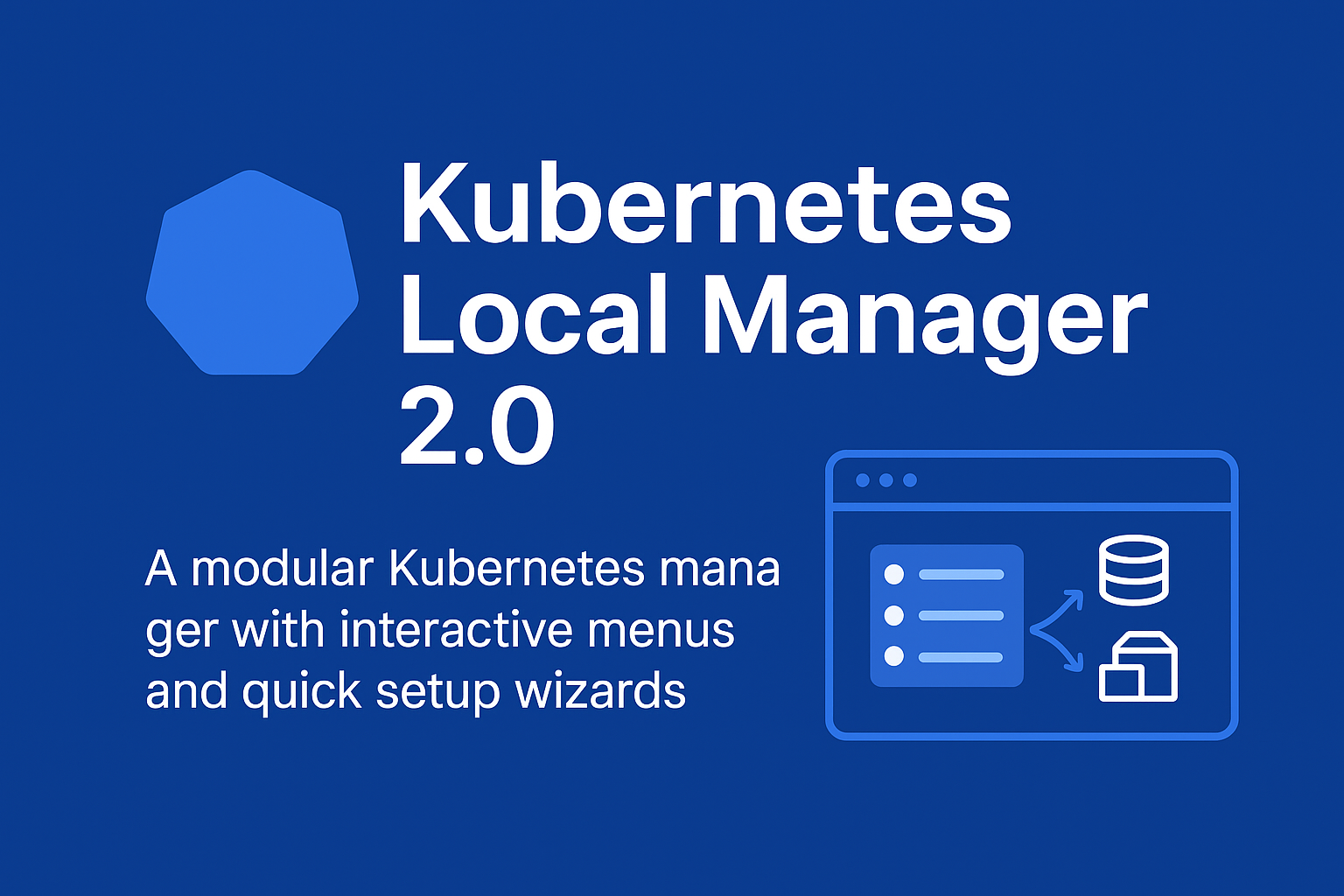Kubernetes Local Manager 2.0 Ubuntu
A modular local Kubernetes manager that makes it easy to deploy 21+ components like Redis, Kafka, PostgreSQL, Elasticsearch, Istio, and Prometheus. With interactive menus and quick wizards, you get a production-like dev environment in minutes

🧭 Overview
Setting up Kubernetes locally usually means hours of fiddling with Docker, Minikube, Helm, databases, message queues, and dashboards—before you even start writing code.
Kubernetes Local Manager 2.0 changes that. With just one script, you can spin up a full local Kubernetes environment on Ubuntu—complete with 21+ pre-built components (Redis, PostgreSQL, Kafka, MinIO, Elasticsearch, Prometheus, and more).
It comes with two modes:
- 🎛️ Interactive menus → great if you like guided steps
- ⚡ Quick wizards → spin up an entire stack (like AI/ML or microservices) in a single command
Think of it as your production-grade dev lab—right on your laptop.
🔑 Key Features
- 21+ Ready-to-Use Components → Databases, caches, queues, vector DBs, monitoring
- Quick Setup Wizards → AI/ML, data engineering, microservices, web apps
- Menu-Driven Interface → Easy navigation for cluster ops, apps, and monitoring
- Advanced Goodies → Ingress, TLS, Istio service mesh, chaos testing, load tests
- Secure by Default → Network policies, RBAC, backups, namespace isolation
⚙️ How It Works
Install once →
./k8s_manager.sh installhandles Docker, kubectl, Minikube, Helm, k9sStart your cluster →
./k8s_manager.sh startPick your mode:
- Wizard mode (
wizard-complete-dev,wizard-aiml, etc.) - Menu mode (
./k8s_manager.sh) for interactive navigation
- Wizard mode (
Deploy components like PostgreSQL, Kafka, or Redis in seconds
Monitor & test with Prometheus, Grafana, chaos engineering, and load testing
📈 Why It’s Awesome
- 🛠️ Developer-Friendly → Spend time coding, not configuring
- 🚀 One-Command Environments → From scratch to full dev lab in minutes
- 🌐 Ingress Made Easy → TLS and custom hostnames with a single script
- 📊 Production-Like Setup → Service mesh, monitoring, and debugging included
- 💡 Perfect for Experiments → Try new stacks locally without cloud bills
🛠️ What’s Inside
- Storage & Caching → Redis, Memcached, Hazelcast, MinIO
- Databases → PostgreSQL, MongoDB, MySQL, Cassandra, InfluxDB
- Messaging Systems → Kafka, RabbitMQ, ActiveMQ Artemis, Pulsar, Zookeeper
- Vector & Search → Weaviate, Qdrant, Elasticsearch, OpenSearch
- Monitoring & Infra → Prometheus, Grafana, Istio
You can deploy them individually or as pre-configured environments—like Lego blocks for Kubernetes.
🎬 Example Workflow
Here’s how a typical dev session looks:
# 1. Install and start ./k8s_manager.sh install ./k8s_manager.sh start # 2. Spin up a complete dev environment ./k8s_manager.sh wizard-complete-dev # 3. Deploy your app ./k8s_manager.sh generate-manifests myapp dev ./k8s_manager.sh deploy ./manifests-myapp/ # 4. Expose it ./k8s_manager.sh create-ingress myapp-ingress \ myapp.local myapp-service:80 # 5. Test & monitor ./k8s_manager.sh load-test http://myapp.local 1000 50 ./k8s_manager.sh enable-monitoringNow you’ve got: ✅ Databases + caches running ✅ Your app deployed with ingress routing ✅ Dashboards to watch everything ✅ Load testing + chaos tools to push limits
📊 Commands at a Glance
- Cluster →
start,stop,status,restart - Components →
deploy-redis,deploy-postgresql,deploy-kafka,deploy-weaviate - Environments →
create-dev-env,create-database-env,create-messaging-env - Wizards →
wizard-aiml,wizard-data-eng,wizard-complete-dev - Advanced →
enable-istio,enable-chaos,enable-ingress,load-test
🤝 Contributing
Want to improve it?
- Fork the repo
- Create a feature branch
- Test your changes
- Open a PR
Bottom line: With Kubernetes Local Manager 2.0, you can turn your laptop into a mini-production environment—databases, queues, monitoring, and more—without the usual setup pain. 🎉